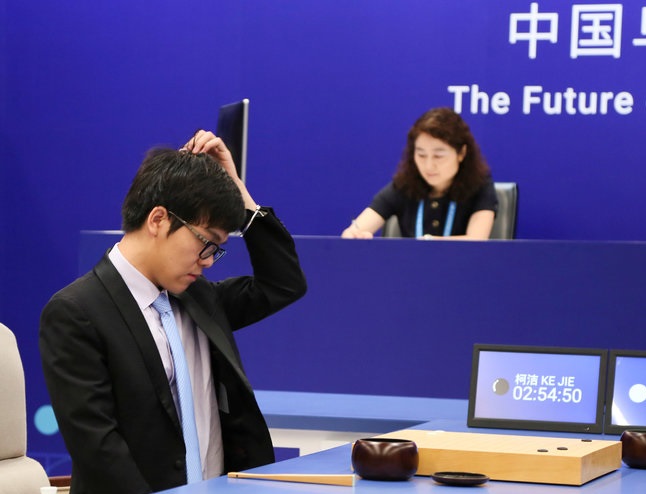The funny thing about the titanic 1997 battle between Garry Kasparov and Deep Blue was that the outcome, so highly anticipated, was a moot point. Within a few years, Moore’s Law was going to make smart machines king regardless of what happened during those tense days in New York City. The match was important to Kasparov’s ego and IBM’s stock price, but the result in a bigger sense was fait accompli.
The fundamental difference between IBM’s two-decade-ago triumph and AlphaGo’s recent stunners is that the latter employed Deep Learning (to an extent) to teach itself. That was necessary since the ancient Chinese game is magnitudes more complex. One important similarity, however, is that world Go champion Ke Jie echoed Kasparov in his comments about the frailty of a human in a contest with a machine, acknowledging that his emotions were not an ally. “Maybe because I was too excited,” he said “I made some stupid moves. Maybe that’s the weakest part of human beings.”
“The future belongs to AI,” the human player concluded, broadly extrapolating his trouncing.
In a Guardian article, Tim Dunlop agrees that the Go victory does in fact have wide-ranging implications, especially for the future of work. He suggests we should consider consciously uncoupling work from salaries, something that’s already getting a dress rehearsal if you consider the hundreds of millions among us already creating free content for Facebook and Twitter and Instagram. The writer offers an extremely hopeful take about the potential nature of this new normal should we be able to abandon our traditional work ethic.
An excerpt:
In Go, there are more possible moves than there are atoms in the universe, so number-crunching is not enough: a computer simply cannot memorise every possible Go move, or even a significant fraction of them. The program therefore needs to be able to “think”, to understand the state of play and develop a strategy in order to win. Until recently we could kid ourselves that there was something uniquely human about this type of intelligence, but no more.
This has enormous implications for the future of work.
Work, broadly defined, is likely to always be at the centre of human self-worth. We are embodied creatures and we understand ourselves by interacting with our environment physically and mentally. It’s this embodiment that makes us different from machines and why machines will never actually think like us, no matter how smart they get. For humans, it is meaningful to do work of many different kinds and we will always find work to do that we find satisfying and fulfilling.
The problem is that work has come to mean “a paid job” and, for most us, that means working for someone else. Under these circumstances, we value “work” less for the improvement to our self-worth it brings us as embodied human beings than for the fact that we have to sell our labour to earn a wage in order to survive.
So when economists tell us that we don’t need to worry about robots taking our jobs because technology will create new jobs, they are basically arguing for perpetuation of this status quo, where the few employ the many and where “work” is a paid job. In fact, more than that, they are defining us as mere units of production, inputs into the economy, rather than as embodied beings seeking meaning by interacting with the world around us.
But in a world of incredibly smart machines, is this really the best future we can imagine for ourselves? After all, there is nothing intrinsic to human self-worth about selling your labour to the owners of capital. In fact, in many ways it represents the worst of us, an exercise in exploitation, where the few wield power and control over the many.
Is it possible that the rise of ever-smarter machines, those exemplified by AlphaGo, may offer us a way out?•

